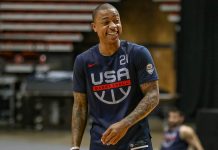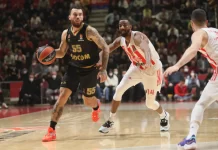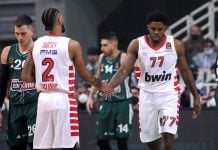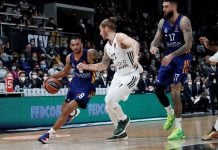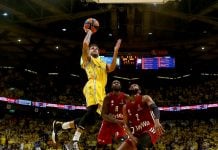Keith Langford is a player who needs no introduction. The EuroLeague trophy may be still missing from his collection of silverware, but the recently turned 36 slasher has always been capable of delivering the goods whenever required. The 2019-2020 campaign will find him in the ranks of AEK Athens, the 2018 Basketball Champions League winners, who will try to make a fresh start after an underwhelming last season.
Langford will call and also take the shots, having renewed his “license to kill” any opponent that stands in his way. As chance would have it, AEK’s first official game for the Greek League will be against their co-resident at the OAKA Arena and Langford’s ex-team, Panathinaikos OPAP Athens.
TalkBasket.net had the pleasure of discussing with the prolific scorer, in what proved to be an interview with many interesting lines about his past, present and future, including some quite revealing details concerning his stint with the “Greens”.
Q: Our last encounter was three months ago, when you told me that you were not going to stay with Panathinaikos and that you were trying to find another EuroLeague team. What happened exactly?
A: It’s one of those things that happen in Europe. Once you get to a certain age, people are scared of what they see on the paper. We see a guy that has been playing in Europe for fifteen years and has just turned 36. This situation must have been scary for a lot of teams. Obviously, I understand that, but I know that I’m kind of the exception to that rule. I still can play at a high level, but it’s not about what I think because the team has to decide if they want you or not. It’s one of those situations, where EuroLeague teams want someone younger. There was a situation that I could have gone to a EuroLeague team, but I wouldn’t play that much and at this point I still want to play.
Q: In other words “be yourself”. Is that what you meant when we last spoke?
A: Exactly. And being myself doesn’t mean I have to shoot the ball every time, but it means being able to play and being an important piece of the team. With the opportunity that I had in the EuroLeague this summer, I don’t think that I would have been able to do that.
Q: What was the focal point of the discussions you had with AEK Athens’ coach Ilias Papatheodorou and owner Makis Angelopoulos?
A: It’s interesting because last year I had a couple of my best games against my current coach, in the Panathinaikos-PAOK games. I think he saw and knew that I still was capable of playing at a high level. He said to me: “Hey, I know that you’re getting older but I’ve seen with my own eyes that you still can play”. He told me his philosophy on what he wanted to do and how. It just fit what I wanted. At the end of my career, we both had the same understanding. He told me that he had talked to coach Pascual and to some other people and they were all like “go ahead and do it”. After he talked to them and I talked to him, it was a good fit for me. Also, being able to stay in Athens was important. I’ve made the sacrifice of living in some pretty bad cities in my career, like Kazan and China. I don’t want to say they’re bad, but obviously it’s not the lifestyle that you would hope for.
Q: I’ve heard mixed reviews about Kazan, to be honest.
A: In Kazan I had a great time, but being at -40 degrees for six months out of the year and see the sun going down at 3 o’clock in the afternoon is not exactly what I would choose. I have kids and family and it’s not great for them either. I loved my time in Kazan, no disrespect. But if I can finish my career in a place like Athens, for me this is the ideal. In a city that has lifestyle, culture and atmosphere and still a good level of basketball that I can play in and be relevant. For me, it’s a no-brainer.
Q: Last year, in the Media Day of Panathinaikos OPAP we were talking about Quino Colom and Nick Calathes. Who’s going to dish the assists in AEK Athens this season?
A: It will probably be by committee, consisting of whoever the guards are. I think Gikas is an exceptional passer, but our style of play and the offence that we have allows for anyone to bring the ball up, bring in transition and make plays. We have a mix of playmaking and shooting that’s good. That’s why I don’t think we need a traditional point-guard that’s going to have the ball every time and bring it up. No disrespect to anybody, Nick (Calathes) or anyone else that plays this style, but for our team, doing it by committee and sharing the responsibility of ball handling is going to work a little bit better.
Q: At the same time, Marcus Slaughter will need the guards’ passes in order to flourish.
A: Of course. Marcus isn’t necessarily a player that you just feed on the block. He’s going to roll, do some pick-and-pop stuff. He’s ideal because you don’t have to run plays for him. He’ll find his baskets and his offence within the flow of the system; and the coach’s system is really good. I even thought that playing against him last year with PAOK and in the VTB League with Astana, his offence is always very difficult to guard. Apart from the pick-and-roll, he has very good off-ball and post-up actions, screens, spacing concepts and ideas. He’s very good.
Q: Last year, you probably noticed that the fans of AEK were not really present, apart from 2-3 exceptions. What does it take to bring them to OAKA?
A: The simple answer is winning. I was in a similar situation in Milan, where the team has a lot of tradition but when I arrived, the fans didn’t come. We barely had fans. Once we’ve started to turn around the atmosphere and the energy, people started to see that. Everybody loves the winner. The more you win, the more they will come out. The important thing about AEK fans is that we know that they’re here, that they exist. If we do what we’re supposed to do, they’ll come. The worst thing would be if there were no fans at all and we were trying to put people in the stands. If you want a little bit more, you have to do a little bit more. Last year, if AEK had made the finals -everybody expected them to beat Promitheas- it would have been a full stadium against Panathinaikos. It’s understandable that the fans didn’t come out for Promitheas.
Q: How is the competition this year?
A: I don’t think the Greek League is as respected as it should be. It’s a little bit better than what I thought, honestly.
Q: Even after what happened last year?
A: If we’re talking about logistics and business and some of those things, it’s bad. It’s one of the worst leagues in Europe. From the standpoint of basketball, it should be respected a bit more than what it is. You have some very good coaches here. They’re all tacticians, everyone is trying to outsmart the other one, but the overall level of basketball is tough. I don’t think that the talent level is superior, but the toughness in this league is very high and makes it competitive.

Q: You have played in almost every Pan-European club competition in your career. Now, you’re going to try the BCL. What do you expect?
A: Yes, I’ve played and won the Eurochallenge as well. I have learned that you can’t take for granted that it’s going to be easy. The Eurochallenge team that I played on when we won the trophy (with Virtus Bologna, in 2009) had faced Nando De Colo, Rodrigue Beaubois, Kevin Seraphin (players of Cholet, Eurochallenge Cup finalists). Either you’re playing the superstars of this generation or the future superstars of the next generation. So, you have to respect everybody at every level. It’s the same concept: players who are in the BCL will probably move up to EuroCup or EuroLeague eventually.
Q: Will a BCL Final Four participation be the remedy for AEK and yourself?
A: That’s the plan and our goal, 100%. I don’t see why we can’t be in the Final Four. If we don’t make it, OK. Obviously, a lot of things can happen during the season but as I stand here right now, that’s how I feel.
Q: This will be your 15th season in your professional career. Never tired of being the go-to guy?
A: You don’t get tired of it because at the moment I do get tired of it, it’s time for me to stop playing. At this point, for me to be 36 and feel the way I feel about basketball, being a go-to guy is still unbelievable. I still love it. I wake up every day and I’m excited about the week or about practice and games. It’s really special.
Q: Won’t you miss playing in the EuroLeague?
A: It’s not necessarily about playing in the EuroLeague because as an individual I’ve pretty much done everything that you can do. Maybe I missed the opportunity to win the EuroLeague and I have to accept that. It’s part of my career but I still want to win championships. The thing that I missed more last year was being an important piece for the team. That feeling of being important and being a consistent part of the everyday team means more to me than being in EuroLeague or EuroCup, NBA or whatever. Everybody wants to feel wanted and to really play.
Q: Were you having those feelings mostly in the Rick Pitino era of Panathinaikos OPAP?
A: Yeah … I think coach Pascual wanted to do some certain things, but I don’t think he had the freedom to do so. There was some other stuff that I’d rather not talk about. He wasn’t free to just do whatever he wanted to do with the team. I can’t say that it was because of the management, but if Xavi had been free to choose how he wanted to play people and do things, without getting criticism or without being in trouble about it, the situation could have been different. I know that to be true because when I saw Xavi this summer, he told me that in hindsight, he would have liked to have done some things differently.
In Rick Pitino’s defence, when he arrived I was injured. He brought in Sean Kilpatrick and once I came back and got healthy again, I definitely had a few good games; but in his mind, once Kilpatrick came, I was pretty much finished. Just coming from the bench and being his back-up, there was always kind of a conflict of interest.
Q: I’m curious to know what you think of Jimmer Fredette, since you’re going to face him very soon and he’s also your successor at Panathinaikos.
A: Everyone knows that Jimmer is a historical scorer. He’s one of the best college basketball players of all time. I played against him in China once and we actually beat his team. Everyone is interested to see how he will adjust to EuroLeague and things like that. I think that just like any player in their first year in EuroLeague there’s going to be ups and downs, but man I watched a couple of games from the Patras and the Giannakopoulos Tournament. He’s going to be fine. He’s smart and talented enough to make the necessary adjustments.

